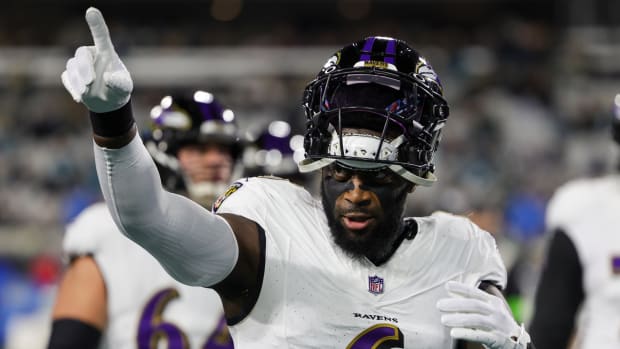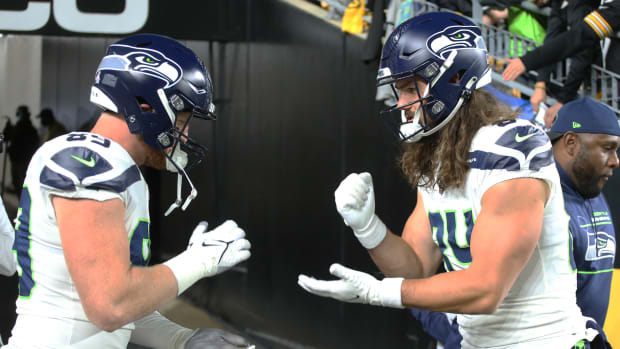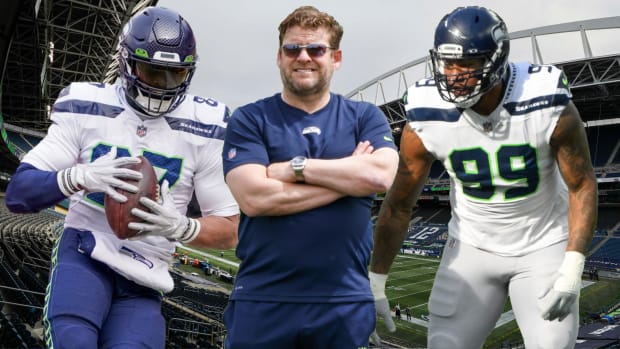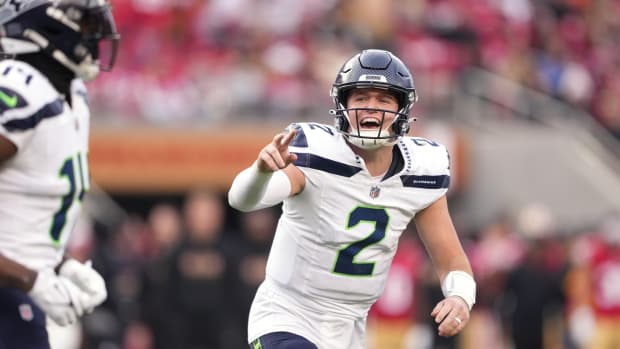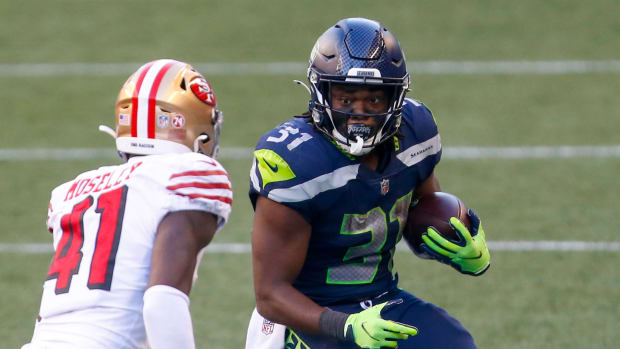Redoing the Seahawks' Disappointing 2016 Draft
It is so difficult for a franchise’s brass to get a draft right. There are so many moving parts and possibilities that it makes it nearly impossible to nail every single one.
Every general manager has picks he wishes he could get back. Every team has players they passed on and let slip to other teams that they now regret.
General manager John Schneider and the Seahawks are no exception. It's impossible to predict that a fifth rounder will become a Pro Bowl pass rusher or an undrafted free agent will be a starting running back.
The 2016 draft gave the Seahawks several starters that contributed, but if they were able to redo the draft, their selections would likely look a lot different.
Looking back, there were several opportunities where, if the Seahawks had made a different selection, the ensuing seasons could have been much different and perhaps even another Super Bowl trophy could be residing in the case at the VMAC.
Round 1, Pick No. 26
Original Selection: After trading down in the first round with the Broncos, the Seahawks selected OL Germain Ifedi at No. 31 overall and used the additional third round pick (No. 94) on TE Nick Vannett.
Redo selection: Michael Thomas, WR, Ohio State
Fans loved to pile on the penalty-happy Ifedi, but the fact is that the Texas A&M product proved to be a serviceable starter. He was drafted as an interior lineman but eventually moved to the right tackle spot and missed just four starts in four seasons.
Though he was marred by penalties and at times, poor play, Ifedi's career overall in Seattle was a positive while there was plenty of uncertainty elsewhere along the offensive line.
Seattle also received the No. 94 pick in this trade, which turned into tight end Nick Vannett. The Ohio State product couldn't get on the field consistently and never exceeded 29 catches or 269 yards in a season.
With the redo selection, Seattle gets an All-Pro weapon for Russell Wilson, putting the rest of the NFL on notice.
Thomas has amassed at least 1,100 receiving yards in every one of his four seasons with the Saints. Last year, he reached new heights, setting an NFL record with 149 receptions for a league-best 1,725 yards.
In his first four seasons, the former Buckeye has been named to three Pro Bowls and has been named First-Team All-Pro in each of the last two years. Somehow, Thomas inexplicably lasted until pick No. 47, falling into New Orleans' lap.
Looking at the landscape of Seattle's offense in 2016, Thomas would have been paired with fellow All-Pro pass catcher Jimmy Graham, along with veteran Doug Baldwin and budding star Tyler Lockett. An arsenal like that would have put Seattle's offense on another level with Wilson throwing balls to that group.
Round 2, Pick No. 56
Original selection: Trading up to pick No. 49 and sending a second and fourth-round pick to the Bears, the Seahawks drafted Alabama DT Jarran Reed.
Redo selection: Yannick Ngakoue, DE, Maryland
Like Ifedi, Reed has turned in a respectable career in Seattle after being a high draft pick. Earning a starting role in his second season, the Alabama product soared in his third year in 2018, collecting 10.5 sacks as a defensive tackle.
A suspension derailed his encore campaign as he played 10 games last year and turned in just 2.0 sacks along with his lowest Approximate Value (via Pro Football Reference) season since his rookie year. After signing a new two-year deal, Reed could still contribute and validate this selection even further.
Considering the needs of the team the last several seasons, however, drafting a Pro Bowl pass rusher would be a smarter choice.
Ngakoue made an instant impact in Jacksonville after they took him 69th overall, notching 8.0 sacks with an interception in his rookie year. The former Maryland Terrapin has never turned in a season with less than 8.0 sacks and the Pro Bowl came calling in 2017 after he amassed 12.0 sacks and a league-high six forced fumbles.
At just 25 years old, Ngakoue has turned in four solid years and has been a consistent pass rushing presence in Jacksonville that Seattle has sorely lacked out on the edge. Pro Football Focus has handed him at least a 72.0 grade in each of the last three seasons.
The 2016 Seahawks squad still had Michael Bennett and Cliff Avril, who both battled injuries before Frank Clark took over. Pairing Ngakoue with Clark would have made the next lethal pass rushing duo for Seattle until Clark's departure after the 2018 season. It's also likely Ngakoue would not be as unhappy in Seattle as he is with his current situation with Jacksonville's front office.
Round 3, Pick No. 90
Original selection: C.J. Prosise, RB, Notre Dame
Redo selection: Tyler Higbee, TE, Western Kentucky
Prosise is the classic example of "what could have been." The Notre Dame talent just could not stay out of the training room during his time in Seattle. He never played double-digit games in a season in four years and only exceeded six appearances once, which was last year as a little-used reserve.
Everyone got a glimpse of his immense potential when Seattle defeated the Patriots in New England in prime time in 2016, as Prosise totaled 153 yards on the ground and in the passing game. However, his durability hindered his progression greatly and that potential went largely unfulfilled.
On top of nabbing the All-Pro Thomas in the draft, the Seahawks get Higbee in this redo scenario to complement Jimmy Graham in the tight end room. The Western Kentucky product has increased his production each season for the Rams, who took him with pick No. 110.
This past season, Higbee reached a new career-high with 734 yards and three touchdowns catching passes from Jared Goff. Pro Football Focus gave him raving reviews with an 86.1 grade for the 2019 season, better than Pro Bowl tight end Zach Ertz. Over the last three seasons, the 27-year-old has accumulated 1,321 receiving yards and six touchdowns.
Higbee has accomplished something very few Seahawks tight ends have been able to do and that is stay healthy, having missed just one game in the last three years. If Seattle went with him instead of Nick Vannett or Will Dissly in 2018, they would have gotten more availability and production thus far.
Round 3, Pick No. 97
Original selection: Rees Odhiambo, G, Boise State
Redo selection: De'Vondre Campbell, OLB, Minnesota
Seattle looked for offensive line help in the 2016 draft, selecting Ifedi in the first round and Odhiambo in the third. Coaches tried fitting the Boise State alum in different spots, but he never really stuck anywhere on Seattle's offensive line.
Odhiambo started seven games in two seasons with the team before being released, playing in a total of 15 games with Seattle.
After the 2015 draft, the Seahawks went through several players at SAM linebacker after the departure of Bruce Irvin, including Michael Wilhoite, Austin Calitro and Mychal Kendricks. Campbell could have filled that need from the start, being an immediate replacement for the loss of Irvin.
Campbell played his first four years for Dan Quinn and the Falcons, playing a very similar defense in Atlanta to Seattle's scheme under Pete Carroll, Quinn's mentor. He has flourished playing in a system that uses many of the same concepts as Seattle's. The Minnesota product has started each of his four years thus far and has not missed a single game in the last three years.
In 2019, Campbell reached 100 tackles for the first time in his career with 129, marking his third straight year with at least 90 takedowns. During the last three years, he has also collected 5.5 sacks and 13 tackles for loss.
Putting Campbell in a lineup with Bobby Wagner and Wright would have enhanced his career even further and put him on the path to be one of Seattle's linebackers of the future.
Round 5, Pick No. 124
Pick No. 147- Via trade with the Patriots, the Seahawks moved down to pick No 147 to draft Maryland DL Quinton Jefferson and added a seventh round pick that was used on receiver Kenny Lawler.
Redo selection: Matt Judon, DE, Grand Valley State
Jefferson carved out a respectable role in Seattle's defense over his four seasons with the squad, finishing with 39 games played and 24 starts. His best season in Seattle was his last, as he set career-highs in tackles and sacks. Playing defensive end and tackle, the Maryland alum offered versatility that is welcomed on any defense.
Lawler never played a snap for Seattle and was released ahead of the 2017 season after spending a year on the practice squad.
Despite Jefferson's usefulness in Pete Carroll's defense, the production of Judon far exceeds his accomplishments over the last four seasons. The Grand Valley State alum has improved every year and reached the Pro Bowl in 2019, getting his first nod with 9.5 sacks and a whopping 33 quarterback hits, the fourth-most in the NFL.
With Seattle already selecting Ngakoue in this scenario, putting Judon on the same defensive line along with Bennett, Avril, and the blossoming Clark would have made Seattle's pass rushing group one of the most feared in the NFL.
Round 5, Pick No. 171
Original selection: Alex Collins, RB, Arkansas
Redo selection: Alex Collins, RB, Arkansas
This is a rare case where Seattle may want to consider drafting the same player in the redo scenario. However, this time, the Seahawks should not be so quick to release Collins following his rookie year.
Seattle drafted three running backs in this draft, hoping to find Marshawn Lynch's replacement as he had announced his retirement before the 2016 draft.
Seattle released Alex Collins before the start of the 2017 campaign, which was an especially bad year for the Seahawks' run game. The leading rusher was quarterback Russell Wilson with 586 rushing yards and the top running back was Mike Davis with 240 yards.
The Seahawks released Collins after he played 11 games in his rookie campaign in 2016, running the ball just 31 times for 125 yards. If they had hung on to him for just one more season, things might have broken differently in 2017, a year in which Seattle missed the playoffs by one game.
Instead, Collins was scooped up by the Ravens and became a key part of their offense that season. In 15 games, the Arkansas product ran for 973 yards and six touchdowns while also collecting 187 receiving yards, totaling over 1,160 yards from scrimmage in Baltimore.
Collins ran into legal trouble ahead of the 2019 season and was released by Baltimore. However, had the Seahawks had that kind of production from a running back in 2017, they might have made the playoffs.
Round 6, Pick No. 215
Original selection: Joey Hunt, C, TCU
Redo selection: Ted Karras, G, Illinois
Seattle selected three offensive linemen in the 2016 draft and in the redo scenario, they have yet to pick one. Hunt turned into a respectable reserve lineman who has started 11 games over the last four seasons including eight at center last year when Justin Britt went down with an injury. He likely never will be a long-term starter in this league but he played his depth role well.
Karras, on the other hand, was still on the board when Seattle selected Hunt. The Illinois product has missed just four games in four years with the Patriots, who selected him with the 221st pick.
After providing depth along the offensive line for three years, Karras earned a starting spot at center in Tom Brady's last year in New England. He has made 20 starts and played 60 games in his career. Seattle would have welcomed his versatility and he would have been an upgrade at all three interior linemen spots as a reserve or even starter.
Round 7, Pick No. 225
Original selection: Traded to Patriots
Redo selection: Jalen Mills, S, LSU
Originally, Seattle did not pick at No. 225, as they dealt the pick away. In this scenario, the Seahawks select Mills to reinforce a secondary that needed an infusion of young talent.
Heading into the 2016 season, the Seahawks still had the "Legion of Boom" intact, though their decline was beginning to creep in.nThe depth behind those Seahawks legends was sorely lacking, with Jeremy Lane and DeShawn Shead manning the corner spot opposite Richard Sherman and with Kelcie McCray and Steven Terrell backing up Earl Thomas and Kam Chancellor at safety.
Coming from LSU, a hotbed for defensive back talent, Mills would have offered great versatility for a seventh round pick. He entered the draft as a safety but switched to corner when the Eagles selected him at No. 233.
When Philadelphia won the Super Bowl following the 2017 season, Mills made 18 starts including their three postseason games on their way to a title. Mills had 13 tackles and five passes defended during those three postseason contests.
The former LSU Tiger has started 34 games and appeared in 48 total contests over four years. Injuries have prevented him from becoming a feature piece in Philadelphia's defensive backfield since winning the Super Bowl.
Had Seattle selected him, Mills would have provided solid depth at every defensive back position and would have been ready when the time came due to injury or departure of one of the Seahawks' defensive stars.
In the 2017 draft, Seattle selected three safeties and a cornerback. If Mills was on the team, they might have been able to use some of those picks on other needs, deepening the roster further.
Round 7, Pick No. 247
Original selection: Zac Brooks, RB, Clemson
Redo: Peyton Barber, RB, Auburn
A surprise selection as the third back taken by the team, Brooks never played a snap for Seattle and was released before the end of the 2016 season.
Though Seattle remained with their original pick of Collins at running back in the fifth round in this imaginary scenario, we now know that he would likely not have lasted past the 2018 season due to legal trouble and would not be the starting running back heading into the 2020 season.
Barber went undrafted in 2016, only to eventually become Tampa Bay's starting running back in 2018, rushing for 871 yards and five touchdowns while totaling nearly 1,000 yards from scrimmage.
Though he was beat out by Ronald Jones II for the starting gig in 2019, Barber still contributed with almost 600 total yards and seven touchdowns. Seattle could have used the depth that Barber provides, given the team's turbulent situation at running back following Lynch's departure before the 2016 season.
Perhaps if the Seahawks had Barber, they wouldn't have felt the need to draft running back Rashaad Penny in the first round in 2018. Having him as a one-two punch with Chris Carson in 2018 would have excited the coaches and enhanced the offense.
